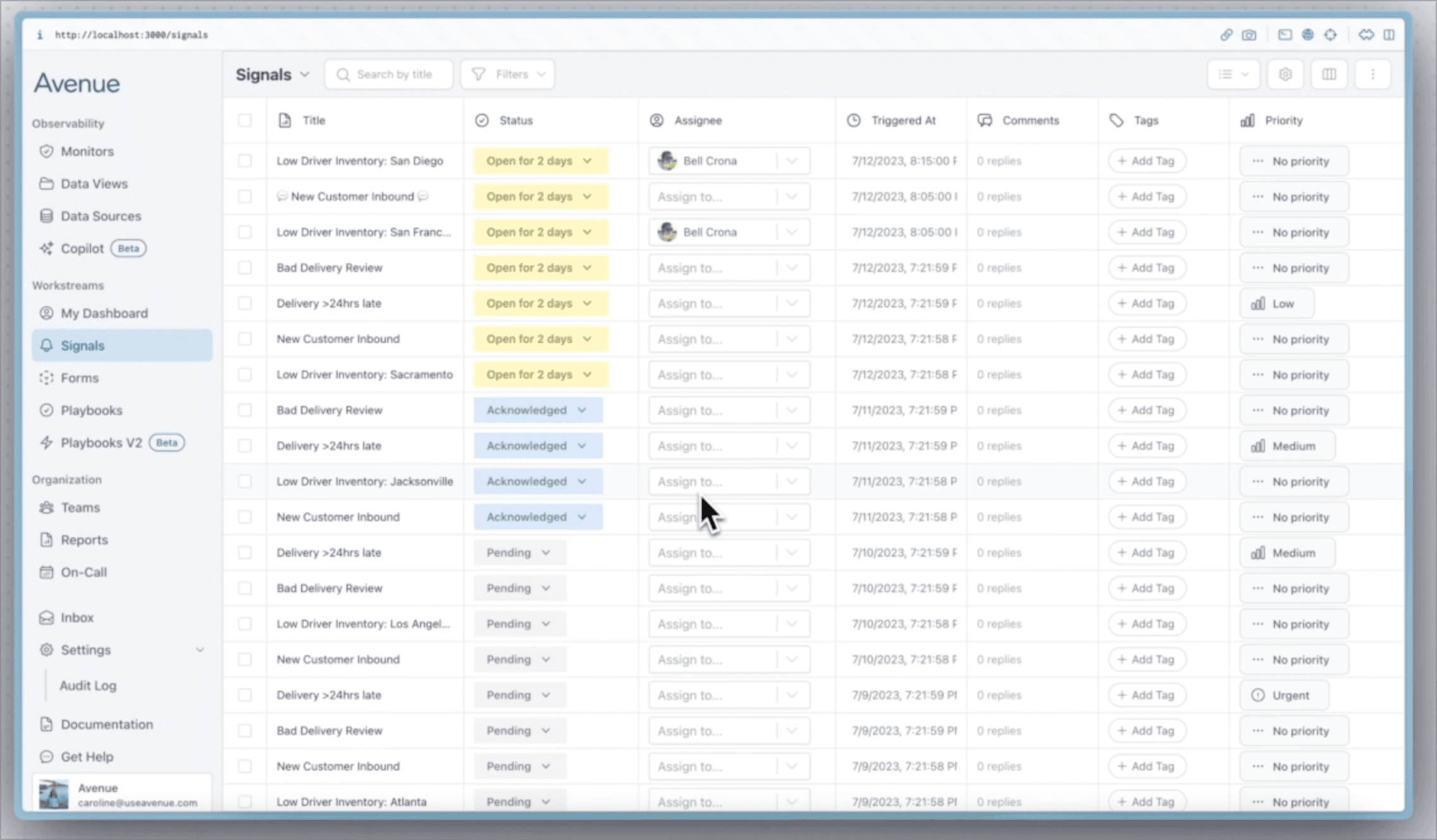Thought Piece
When it comes to scaling a start-up, building a strong operations team, even if it starts with one person, is crucial. The right team can identify and address business gaps, streamline processes, and improve the customer experience. A key element of an effective ops team is having access to and understanding essential data. In this article, we will discuss the key elements start-ups need to consider when building their operations team and how companies are already harnessing the power of data to grow and retain customers. By utilizing data infrastructure effectively and leveraging tools like Avenue, your operations team can work more efficiently and identify issues even as your business expands.
Infrastructure: The tooling needed to capture, visualize, and act on your data
When scaling a start-up, it's essential to have a robust data infrastructure plan in place. This includes investing in data warehouses such as BigQuery or Snowflake and ensuring your ops team has a strong foundation of SQL knowledge. Next, adopt a BI (Business Intelligence) tool like Mode, Looker, or Metabase to visualize and analyze your data. Too many companies fall victim to analysis paralysis or too much time spent analyzing with little change in business outcomes. That’s where the data actioning tooling comes in – a tool like Avenue equips your operations team with the information and ability to easily take action. Avenue connects to your data sources (from your data warehouse or tools like Google Sheets) and enables your operations team to write rules using SQL to identify issues and improve processes.
Defining Operations Team Capacity
Before scaling the business, start-ups must understand the capacity of their operations team. This includes evaluating how many problems the team can manage and resolve concurrently, their ability to monitor issues across different regions or cities, and their adaptability to changes in the business landscape. With Avenue, operations managers, particularly those running decentralized ops teams, have a centralized hub to monitor and track their team’s workflows. Take for example, one of Avenue’s customers, an operations manager at a food delivery app. As this app has expanded to more regions, the manager has used Avenue to check in on their team’s task queue. Start-ups should quantify these variables to estimate the required team size as the business expands, ensuring that they maintain efficiency without linearly scaling their operations team.

Scaling with Playbooks
For start-ups planning to expand their operations and customer base, it's essential to establish SOP’s (or playbooks). When a business event happens, what are the steps that need to be taken? Whether scaling is geographic (like a ride hailing app expanding to a new city) or product-driven (like a SaaS company releasing a new feature), it’s important that the central operations team establishes playbooks so procedures are clear. Using Avenue’s playbooks, ops teams can streamline workflows and ensure that the correct actions are taken when specific events occur.
Monitoring and Managing Risks
As start-ups scale, the operations team must be prepared to handle any risks that may arise. By investing in a data-driven approach, the team can identify risks and allocate resources accordingly. It's vital to understand what capacity the risk team can handle to estimate the necessary team size as the business grows. Teams should also invest in tooling that will enable individual operators to be more efficient. A data analyst at a fintech start-up approximates that Avenue saves him 10 hours a week in manual QA and dashboard “dives.” By leveraging Avenue, start-ups can ensure they invest properly in their risk management teams and avoid linearly scaling them with business growth.
Aligning with the Product Team's Roadmap
As the business scales, the operations team should collaborate closely with the product team to ensure a cohesive strategy for growth and development. In addition to saving time for operations teams, Avenue’s traceability features give companies a bird's-eye view of their operations team's capacity and commonly occurring issues. An ops manager in the healthtech space uses Avenue for headcount planning. Each quarter he reviews the volume, type, and time to respond to all operations tasks in his Avenue dashboard. From there, he can determine if his team needs to hire and what operations pain points should be solved by the product team. With Avenue, the operations team can quantify their efforts, better understand their requirements, and communicate more effectively with the product team. This alignment helps the start-up maintain efficiency and ensures operations processes scale as the business grows.
Grow your Operations Team Today!
In conclusion, building and scaling operations teams are essential elements for the success of any startup. By prioritizing access to essential data and utilizing robust data infrastructure, startups can make informed decisions and respond proactively to challenges as they grow. With Avenue as a powerful tool in their arsenal, operations teams can take quick and actionable steps to address issues and improve processes, ensuring efficient scaling without sacrificing quality. Companies that have embraced Avenue from the outset recognize it as their “ops control center.” From centralizing workflows to monitoring team capacity, streamlining playbooks, managing risks, and aligning with the product team, Avenue facilitates seamless coordination and data-driven operations management. By embracing Avenue and focusing on these essential elements, startups can set themselves up for sustainable growth and success in their journey towards becoming industry leaders.
Check out Avenue’s short demo video to learn more about operations actionability.











